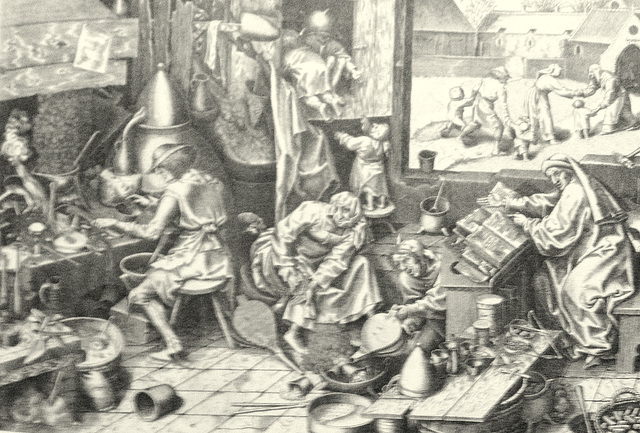Negative geotropism
Tourism
Marlon Brando
Bubba Gump
Griffith Observatory
A Well
Magellanic Clouds
For Sale (Maps)
In celebration
Lady Philosophy & Boethius
Immanuel Kant
David Hume
King Milinda
Forest
Suitcases
The Ballin Ceiling Mural
Lady & her luggage
Yamaha
Betty Garrett
Autumn
Luggage
The Ballin Ceiling Mural
The Ballin Ceiling Mural
DIALOGO DI GALILEOO GALILEILINGEO
Telescope
Shasta dam
Shore
See also...
Keywords
Authorizations, license
-
Visible by: Everyone -
All rights reserved
-
44 visits
Alchemy


A family of alchemists at work, an engraving of Philip Galle, after a painting by Pieter Bruegel the Elder, published by Hieronymus Cock, c. 1558
- Keyboard shortcuts:
Jump to top
RSS feed- Latest comments - Subscribe to the comment feeds of this photo
- ipernity © 2007-2024
- Help & Contact
|
Club news
|
About ipernity
|
History |
ipernity Club & Prices |
Guide of good conduct
Donate | Group guidelines | Privacy policy | Terms of use | Statutes | In memoria -
Facebook
Twitter

Like many alchemists, Boyle was convinced that the quest for the philosopher’s stone en.wikipedia.org/wiki/Philosopher%27s_stone (which would turn base metal into gold) involved a spiritual element. He believed he had been transmutation performed; he evidently thought it likely that the anonymous stranger who had performed it, in his presence with his assistance, was an angel, no less. . . . Page 353
How could Boyle, one of the key figures of Scientific Revolution, be so totally convinced of the reality of alchemical transmutation? The answer is that alchemy was self-fulfilling enterprise. Those who practised it were convinced that the philosopher’s stone had been successfully produced in the past. As George Starkey, who collaborated closely with all their might have sought and found, and left the record of their search in writing, withall so veyling the maine secret that only an immediate hand of god must direct an Artist who by study shal seeke to atteyne the same.’ Like Boyle, Starkey believed he had held the stone in his hand, and with it he claimed that he had been able to turn base metal into gold and silver -- or at least into a sort of gold and sort of silver, for the gold had proved unstable, and the silver, though very like silver, weighed too much. ~ Page 354
Sign-in to write a comment.